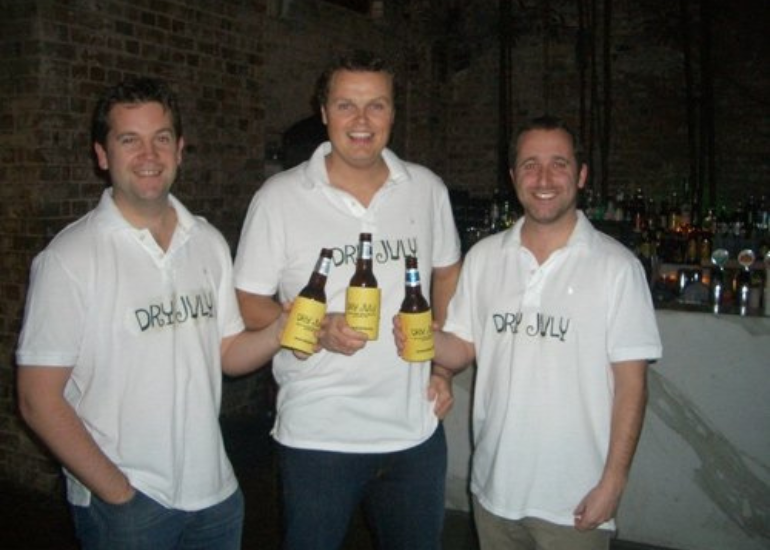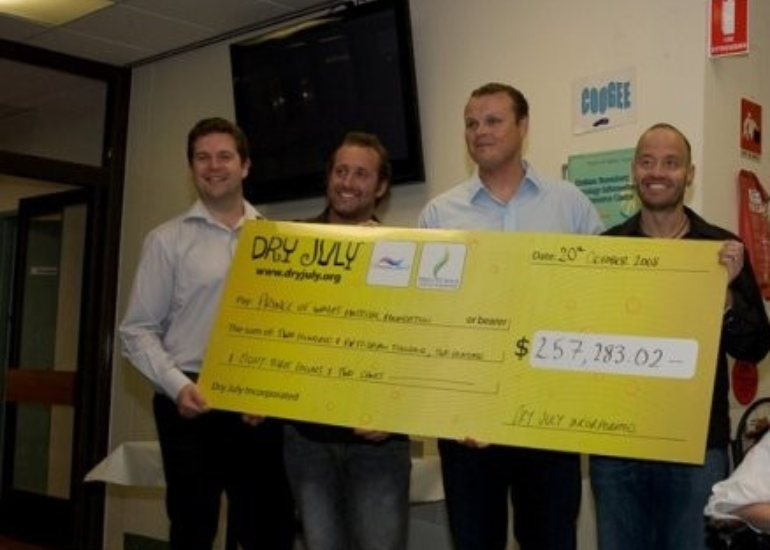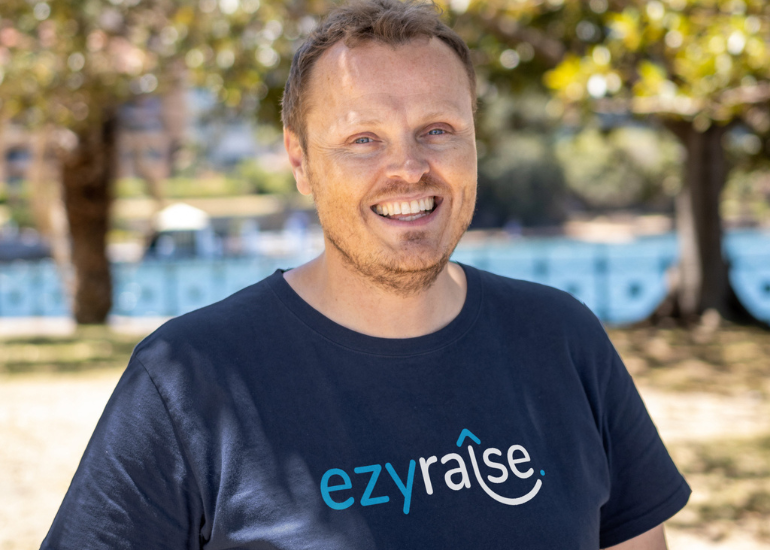As Dry July enters its 15th year, co-founder Brett Macdonald tells Startup Daily about the early days, how the movement grew to raise $82 million for more than 80 cancer organisations across Australia – and where it’s going next.
It started in a small garage in Sydney’s eastern suburbs in 2007. British expats Brett Macdonald, Kenny McGilvary and Phil Grove were living the backpacker lifestyle – drink, sleep, repeat.
After one particularly huge birthday weekend, the three friends set a challenge to see who could go the longest without alcohol. Friends thought it was funny buying them beers to tempt them.
Around that same time, Brett had a relative diagnosed with cancer that spread rapidly.
“Unfortunately, my aunty passed away that July,” Brett recalls. “It just got me thinking, well, instead of these beers going warm on a table in a pub, what if this was a donation to a cancer organisation?”

Dry July founders Kenny, Brett and Phil during the first campaign in 2008. Image: Supplied.
But it wasn’t so simple at first…
Over the coming months, Brett, Kenny and Phil puts their heads together. Brett had experience in graphic design, web marketing and startups, including working for online greeting cards business Moonpig in the UK; Kenny had a background in branding, not-for-profits and communications; and Phil brought the technical product management skills.
“We bounced the idea around and a lot of people thought we were mad and it was a waste of time, but we believed in ourselves and believed we had what it took to get the idea off the ground,” Macdonald tells us. “It was difficult to find an organisation to align with over time. We knew we wanted to support a cancer organisation but we didn’t think we had what it took to approach some high-profile cancer organisations with this idea.”
In July 2008, they built a website and set a goal to raise $3000 to purchase a new TV for the waiting room of the Prince of Wales Hospital’s cancer centre. After a radio interview on 702 ABC Sydney with then-host Adam Spencer, whose father had been diagnosed with prostate cancer, the first Dry July raised $250,000 and a movement was born.

The founders with ABC radio host Adam Spencer (far right). Image: Supplied.
“It was a big risk”
Riding a wave of media and public support, the founders quit their jobs to set up the Dry July Foundation later that year.
“The passion and drive that we had for Dry July, I hadn’t experienced in any other job I’d had,” Brett says.
For those first few years, they bootstrapped the organisation to try and make it work.
“We had rent to pay and bills to pay and it was a big risk,” Brett says. “So we weren’t in a position to go and pay for web development or advertising or lawyers and auditors and things. We begged and borrowed a lot for pro bono services. But certainly [our] collective skill set was critical for us to get it to a certain level where we could actually have some money to fund things.”
Thankfully, the public has embraced Dry July more and more each year. As it stands, more than 317,000 Australians have participated in Dry July. The premise remains simple: go alcohol-free for a month and collect donations from friends and family. The donations are then distributed to local and national organisations that support cancer patients, their families and carers.
For Brett, the biggest strategic challenge has been making a big impact over a limited campaign period each year.
“We’re committed to making sure as much money goes to the organisations and service providers in the cancer space,” Brett shares. “It’s critical that in that eight to twelve-week window, Dry July raises enough funds to fund itself for the following year to survive.”
Why the Dry July strategy works
A key to the success has been tapping into everyone’s different motivations for taking part. It may be for health reasons, the challenge itself or because there’s a personal connection to a loved one affected by cancer. This is reflected in the 2023 theme ‘This is Why We Dry July’.
“The sense of achievement is definitely the biggest thing,” Brett says. “And that’s twofold. We’re not only raising funds for people going through one of the toughest times of their lives, but it’s also people actually being able to give up alcohol for the whole month. The people we chat to haven’t had a week or a weekend or a month without alcohol since the legal age of drinking, so that can be 20, 30, 40 years in some instances, so it becomes a massive challenge.”
The health benefits include weight loss, a better night’s sleep and improved energy levels. But there’s also a very relevant one in the current economic climate: the cost of drinking.
“People find they get more time and they’ve got more money in their pocket,” adds Brett.
Watch: ‘This is Why We Dry July’
A surprise impact on workplaces
Workplaces are also seeing the benefits. “Firstly, there’s no hangovers for the month, so that equals more productivity, better focus and being more present in the workplace and with your colleagues,” Brett says. “It’s also an opportunity for workplaces to talk about alcohol and that relationship with alcohol. This is normally a tricky topic for workplaces to introduce, but Dry July provides a lighter hearted engagement piece and the foundation has a lot of support that they can give workplaces.”
Teams can register together as a team bonding exercise, but Brett says this usually starts with a “workplace champion” to get the ball rolling (and it doesn’t have to start from the top).
“A lot of the time workplaces match any donations that they raise,” he says. “It’s a great way to rally the team in a very different way than they may traditionally have done.”
Scaling the Dry July concept
Over recent years, the trends towards lower alcohol lifestyles and the growth of non-alcoholic beverages available has only made Dry July more relevant.
“During that first year I managed to get hold of some beer-tasting chewing gum from Japan. That was about all I could find in the non-alc beer space,” Brett says. “Now there are so many broad options available.”
That trend is reflected in other markets where Dry July has launched, including the UK, New Zealand and Canada. “Each market has been really strong,” Brett adds.
Dry July has also enabled Brett to launch a spin-off peer-to-peer fundraising platform, Ezy Raise, which helps other charities run and scale mass-market online events and campaigns. Their slate of partners raise funds for cancer care, wildlife preservation, veteran support, mental health and addiction and more.
“It’s testament to what we’ve built with Dry July and how we had one particular cause in mind with what we were trying to build, but in actual fact, thinking a bit differently about how we could do things has opened up a whole range of other opportunities,” he says.

Brett Macdonald started EzyRaise in 2020. Image: Supplied.
Brett’s top tips from 15 years of doing Dry July:
- “Be the designated driver. You will always be popular – but always ask for a donation if you’re driving!”
- “Put your non-alcoholic beverages in a wine glass or a schooner.”
- “Still go out, but change it up! Go for a walk in the park with your mates as a way to socialise, or try a new activity or sport.”
Sign up for Dry July today to raise funds for those affected by cancer.
This article is brought to you by Startup Daily in partnership with Dry July Foundation.
Credit: Source link


Comments are closed.